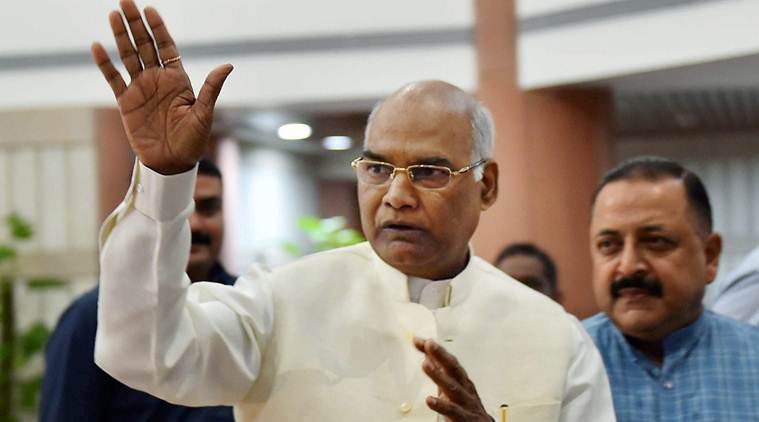AS VOTING concluded for the Presidential election Monday, a sense of impending defeat prevailed among Opposition parties with indications emerging that NDA nominee Ram Nath Kovind could win emphatically, with over 7 lakh votes in his favour, thanks to a larger support base and cross-voting from some sections.
With the cumulative voting percentage adding up to around 99.4 per cent of the eligible electoral college members, and the trend becoming clear early, the focus was on cross-voting by some sections, mostly in favour of Kovind. The most high-profile case was from Uttar Pradesh where former SP state president, Shivpal Yadav, voted for Kovind and claimed that “fellow” MLAs had joined him, too.

“My open support is for Kovindji, who belongs to Kanpur Dehat and is our neighbour,” he said. The SP leader later posted on Twitter that he had voted on the directions of “netaji” (Mulayam Singh Yadav). SP rebel-turned-Independent Rajya Sabha MP Amar Singh, too, voted for Kovind.
Story continues below this ad
In CPI(M)-ruled Tripura, the six MLAs of Trinamool Congress and one Congress MLA defied their parties and voted in favour of Kovind. The Trinamool had already sacked the six MLAs from the party.
“We cast our votes in favour of Kovind. We had announced it earlier because we cannot vote for a candidate supported by the CPI-M,” said Sudip Burman, leader of the six TMC MLAs from Tripura.
The Opposition was also keeping its fingers crossed over votes from AAP, which had announced its support for Kumar. On Monday, however, its senior leader and Punjab MLA H S Phoolka did not take part in voting. AAP’s ally Lok Insaaf Party (LIP), which has two MLAs in Punjab, had already announced its support for the NDA candidate.
With speculation over cross-voting rife, NCP had to publicly deny rumours linked to the party. “The rumours that NCP MPs and MLAs are voting for the NDA presidential candidate are false. We are voting for our candidate Meira Kumar,” said NCP spokesperson Nawab Malik in Mumbai.
Story continues below this ad
By Monday evening, BJP general secretary Bhupender Yadav was confident of Kovind’s victory by over 7 lakh votes in an electorate comprising 10,98,903 votes. Opposition leaders in Delhi and outside, meanwhile, fell back on the campaign line that they were making a larger ideological point by fielding Meira Kumar.
Out of 771 MPs eligible to vote, 768 cast their votes, which translates into a turnout of 99.61 per cent. Similarly, out of 4,109 MLAs, 4,083 cast their votes, which adds up to 99.37 per cent.
Although MPs usually vote inside Parliament House and MLAs in their respective state assemblies, the Election Commission allowed 54 MPs, including UP Chief Minister Yogi Adityanath, Goa’s Manohar Parikkar and Union Minister Uma Bharti, to vote in their respective state capitals. Similarly, five MLAs voted at Parliament House and another four were permitted to vote in another state capital.
Lok Sabha secretary general Anoop Mishra, the Returning Officer, said that in a large number of states, including Arunachal Pradesh, Assam, Bihar, Chhattisgarh, Gujarat, Haryana, Himachal Pradesh, Jharkhand, Uttarakhand and Puducherry, voting was 100 per cent.
Story continues below this ad
Mishra said that the seats of four MPs — two each in Rajya Sabha and Lok Sabha — were vacant while BJP MLA from Bihar Chhedi Paswan was not eligible to vote due to a court case, which left 771 MPs in the electoral college.
Of the five MLAs allowed to cast their vote in Parliament — two from Assam and one each from Gujarat, Arunachal Pradesh and Sikkim — four cast their votes. Sikkim MLA Sher Bahadur Subedi of Sikkim Democratic Front did not vote because he was “unwell”.
On Monday morning, the first to vote was Prime Minister Narendra Modi, who reached Parliament House 10 minutes before voting started. According to sources, he told Parliament staff that he used to reach school early, too.
The 54 MPs who voted in states included 42 in West Bengal, three each in UP and Assam, and one each in Arunachal Pradesh, Odisha, Maharashtra, Karnataka, Goa and Andhra Pradesh.
Story continues below this ad
In Kolkata, West Bengal Chief Minister Mamata Banerjee thanked all Opposition parties for coming together to support Kumar “despite knowing that she would lose, only to register their protest”.
In Delhi, NCP leader Praful Patel said, “There is no rocket science, Ram Nath Kovind will win today… all MPs don’t necessarily vote only according to conscience, they also vote according to party lines, and party lines are divided somewhat on ideology, principles and political positioning.”
BSP chief Mayawati said, “Winning or losing is a different issue. Whoever wins, the good thing is a Scheduled Caste person will be the country’s president. And I think it is a good thing for our movement, the party.”
CPI(M) general secretary Sitaram Yechury posted on Twitter: “Hope the Electoral College picks the custodian of India’s Constitution thoughtfully: Vote to uphold Constitutional Values of our Republic”.
Story continues below this ad
Before voting began, Congress leader Renuka Chowdhury said, “This is not just the beginning of an election but a process for Opposition unity”. But she also expressed unhappiness over the JD(U)’s support for Kovind, saying “Nitish Kumar is on two boats, which is a dangerous thing.”

 NDA’s presidential candidate Ram Nath Kovind. PTI Photo
NDA’s presidential candidate Ram Nath Kovind. PTI Photo






